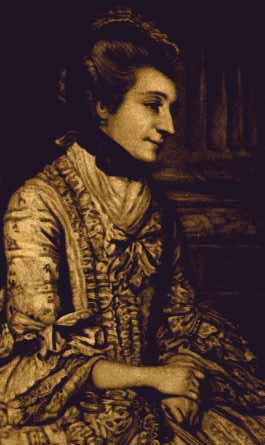

Sources:
Blunt, Reginald, ed. Mrs. Montagu "Queen of the Blues." Volumes I & II. R.& R. Clark, Limited, Edinburg.
Johnson, R. Brimley, ed. Bluestocking Letters. T. and A.
Constable LTD., Printers, Edinburgh: 1926
References to Elizabeth Montagu in "The Unsex'd Females"
[source: http://www.montaguemillennium.com/Research/Historical_2.htm
Elizabeth (Fidget) Montagu, 1720-1800
Socialite, invented the `blue-stocking'. [image/bio].Elizabeth Robinson, very wealthy and well-connected. Grew up at Coveney, Cambridgeshire, under supervision of her grandparents, and was frequent childhood visitor to Cambridge; her grandfather was Librarian of Cambridge University; serious interest as a child in literature, at 12 began correspondence with Lady Cavendish Harley that lasted 50 years; married Edward Montagu, 1742; her only child died within a year, 1744; mother died, 1746; brother died, 1747;
Bereaved, set up house in London, in explicit attempt to set up a central point for intellect and fashion, 1750; the DNB reports that she invariably gave intellect the precedence of rank, she wrote: `I never invite idiots to my house.' Established `conversation parties' known throughout London. These were elaborate evening affairs where gambling was not permitted and literature was frequently discussed; these parties became known as blue-stockings; for 50 years she was the preeminent intellectual hostess in London, and a number of similar `competitors' appeared;
Friends included Horace Walpole, Burke, and Dr. Johnson [1][2] [3][4] . She had a number of protégés, some of which seem to have been in love with her, but she was very proper. When Dr. Monsey `declared that he did not believe a more perfect human being was ever created.' Burke replied `And I do not think that he said a word too much.' Dr. Johnson:
`She diffuses more knowledge than any woman I know, or indeed, almost any man. ... Conversing with her, you may find variety in one.'Anonymously contributed 3 dialogs to Lyttelton's Dialogues of the Dead, 1760; with her husband visited Paris, Germany and Holland, 1763; Scotland, 1766; on these trips she visited many of the celebrities of the day; offended by Voltair's contempt for Shakespeare, she published anonymously her book An Essay on the Writings and Genius of Shakespear compared with the Greek and French Dramatic Poets, with some Remarks upon the Misrepresentations of Mons. de Voltaire, 1769; this was a great success and she became known as its author; husband died, 1775; she ran the families interests and proved a formidable business women; in Paris at the French Academy to attend an attack on Shakespear by Voltaire, 1776; began to build Montagu House, Portman square, apparently primarily for social affairs, 1781; a blue-stocking in it was attended by the king and queen, 1791.Extensive collections of her letters have been published. She described her suitors thus:
`Our collection of men is very antique, they stand in my list thus: A man of sense, a little rusty, a beau a good deal the worse for wearing, a coxcomb extremely shattered, a pretty gentleman very insipid, a baronet very solemn, a squire very fat, a fop much affected, a barrister learned in Coke upon Littleton, but who knows nothing of `long ways for marry as will', an heir apparent, very awkward; which of these will cast a favourable eye upon me I don't know.' (quoted in Sitwell).
Her father's cousin was Baron Rokenby of Armagh in the Irish Peerage, her oldest brother succeeded to the title, 1794;
Known in her youth as `Fidget', she was very fond of dancing. On this she remarked `Why shall a table that stands still require so many legs when I can fidget on two?'
Delany describes her as `handsome, fat, and merry.'
She apparently was always on good terms with her family. Her nephew, Morris Robinson, was her favorite and chief companion after her husband's death, He took the name of Montagu in 1776, and received all her (very extensive) property upon her death.
An example of her writing. There is an on-line forum apparently directed at her literary work.
Sources: The DNB; CDWB; English Eccentrics, Sitwell.]